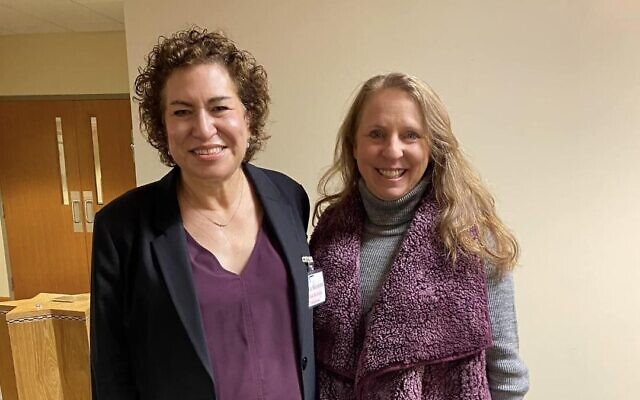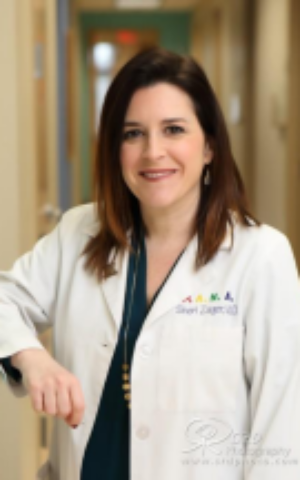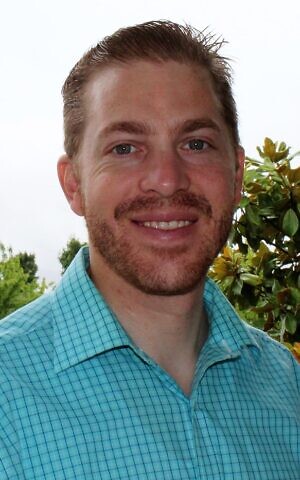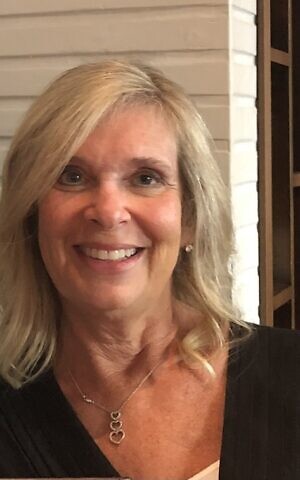Anxiety and Depression in Children and Teens Rising
Experts claim there are not enough providers to meet demand.
To kick off its new, ongoing monthly wellness series, Congregation Dor Tamid in Johns Creek hosted a panel of experts to discuss identifying and treating anxiety and depression in children and teens. The event was sponsored by the synagogue’s social action committee and Sisterhood and made possible by a grant from the Jewish Federation of Greater Atlanta.
Held in early January and facilitated by Sheri Zager, MD, a pediatrician with Pediatric Associates of North Atlanta, the panel included Penny Forman, MD, a pediatrician with Pediatric Associates of Johns Creek, Josh Spitalnick, PhD, founder and chief executive officer of Anxiety Specialists of Atlanta, and Zachary Engler, MD, a psychiatrist who treats children, adolescents, and teens at his Sandy Springs practice. The most alarming takeaway of the evening was agreement by all the clinicians that there are simply not enough psychiatrists and psychologists to meet the demand of an increasingly stressed and depressed population of children and teens both here in Atlanta and throughout the country.

Paula Bloom, chairperson of the synagogue’s social action committee, emphasized that this topic is especially timely and relevant for a congregation that has tackled such pressing issues as feeding the hungry, helping special needs children in Gwinnett County and resettling Ukrainian and Afghani refugees in Atlanta.
“We wanted to do something that would have an immediate impact on our community in Johns Creek and the surrounding areas. We know so many children, teens and adults are suffering with anxiety and depression, and we wanted to give parents and grandparents some guidance on what to do if they believe their children may be struggling. Even if we can help one child, teen or young adult who is dealing with anxiety and depression, we know we will have made a meaningful difference,” said Bloom.
Spitalnick acknowledged that pediatricians are the most accessible and cost-effective solution for many families since many psychologists and psychiatrists do not accept health insurance. Forman agreed and added, “In an ideal health care model, patients would be referred to a psychologist or psychiatrist for initial diagnosis and treatment and then could be returned back to their primary care physician for ongoing maintenance.” Currently, Forman treats many of her patients who are experiencing anxiety and depression on an ongoing basis because many mental health professionals do not take insurance or are not accepting new patients.

Zager also treats many of her patients for depression and anxiety and added that she has had to call and plead with mental health professionals to take some of her neediest patients. Both Zager and Forman indicated that, in recent years, they frequently spend as much time diagnosing and treating their patients’ mental health as they do on their physical health.
Following the guidelines of the American Academy of Pediatrics, all children aged 11 and older are screened for depression and anxiety at each yearly physical or check-up. The patients receive a confidential health questionnaire for depression that asks them about losing interest in “doing things,” feeling down or hopeless, or if they have trouble concentrating, among other questions. The screening questionnaire for anxiety includes questions asking patients if they feel anxious, worry too much, or feel annoyed or irritable.
“I try to build a rapport with my patients. We use tablets for the preliminary questionnaires, and I have found that many kids are more honest responding to these questions than they are in a face-to-face conversation. It is a good starting point,” said Forman.
Parents and other caregivers should be aware of signs that may signal their child may be suffering from anxiety or depression. Tummy aches, headaches or other body aches could be physical in nature or the result of anxiety. In depression, parents will often notice a change in verbal or non-verbal expression, a child becoming quieter or not engaged with the family or peers and withdrawing from activities they have previously enjoyed. According to Engler, “Even during moments when they look happy, they may still have anxiety or depression.”

Both Engler and Spitalnick advise families to seek help when in doubt. Sometimes therapy alone is effective in treating anxiety or depression. At other times, medicine is needed as part of the therapy process. In fact, Engler advised that medication typically works best when prescribed in conjunction with ongoing therapy. In his practice, Spitalnick also pointed out that sometimes adding a medication is necessary to “get children and teens to unlock the doors that will make therapy work.”
All the panelists stressed that it is important to share family history with a physician or therapist when seeking help, although whether environment or genetics is the stronger determinant is debatable, according to the panelists. Engler stressed that not only is a family history needed, but providing a list of medications taken by the patient and any other family members for the same condition will help the physician develop an effective treatment plan.
“Frequently we find that a prescription that has worked for a sibling will be the most effective for that patient too,” he said.
The verbal and non-verbal messages shared by parents are also critical when children are experiencing anxiety or depression. All on the panel agreed that parents should consider their own experiences and be certain to convey a sense of hope to their children. Spitalnick, in fact, mentioned a new approach called SPACE, a process in which parents learn skills and tools to help their child overcome anxiety. The treatment focuses on changes that parents can make to their own behavior. Children do not typically attend the sessions.

Regardless of the type of treatment selected, “systems-based work” that involves the family in a child’s recovery is an important part of the therapeutic process. All panelists agreed that expressing that the family is supportive makes a tremendous amount of difference for a child and teen.
“Actually stating ‘our family is open to getting help’ or ‘we’re here to help you’ can make a world of difference to a family member struggling with either challenge,” said Spitalnick. He added, “Not all children will open up, but therapists are trained to use the appropriate language and meet kids and teens where they are.”
Parents who need to find help for their children may contact the Georgia Psychological Association for local assistance in finding resources. Jewish Family & Career Services also has a number of services available and therapists on staff to assist families. With the addition of the Horwitz-Zusman Child & Family Center, JF&CS has expanded its staff, resources and the types of services offered. The Anxiety & Depression Association of America has a website at www.adaa.org that will be useful in gaining a better understanding of these conditions and a roster of clinicians, and Psychology Today online may be an option as well since it enables users to enter specific criteria for what they are seeking.
Many of the large psychology practices, such as Anxiety Specialists of Atlanta, also offer support groups that foster a sense of community and camaraderie among participants, in addition to being more affordable and easier to access quickly. There are also several new online therapy services and apps that may be useful, though all the panelists caution that some are better than others.
Another topic discussed by panelists was self-harm and the rise in the suicide rate among teenagers. Currently, suicide is the second leading cause of death among children between the ages of 15 and 19. And while cutting is not linked to suicide, it is a way that some children and teens cope with emotional pain, sadness, anger and stress.

Forman and Zager told the group that they ask all their patients to wear a gown during their physicals, so they are able to see if patients are cutting themselves. If they see evidence, they speak with their patients confidentially and treat accordingly.
Substance abuse is another form of self-harm, according to all the panelists, and they urged all adults at the discussion to dispose of any prescriptions they have when finished.
“Kids are testing limits now more than ever. They are destroying their bodies,” said Spitalnick.
In the last several years, the good news is that the stigma around mental health has been lifted, due in large part to social media platforms “getting the word out,” agreed all the panelists. According to Engler, “Kids and parents are talking about their therapy. The winds are shifting, and we see it happening in schools — among administrators, kids, and teachers.”
Spitalnick concurred and said, “Children and teens grew up surrounded by social media, and it’s the most likely way to get their attention.”
Anxiety Specialists of Atlanta is accepting new patients and offers a range of therapists with different fees. The office may be reached at www.anxietyspecialistsofatlanta.com or 678-825-2320.
The Horwitz-Zusman Child & Family Center at JF&CS may be reached at www.jfcsatl.org/services/horwitz-zusman-child-family-center-programs or 770-677-9300.
- education and camp
- Health and Wellness
- Debbie Diamond
- Congregation Dor Tamid
- John's Creek
- Sisterhood
- jewish federation of greater atlanta
- Sheri Zager
- Pediatric Associates of North Atlanta
- Penny Forman
- Pediatric Associates of Johns Creek
- Josh Spitalnick
- Anxiety Specialists of Atlanta
- Zachary Engler
- Paula Bloom
- anxiety and depression
- American Academy of Pediatrics
- Tummy aches
- headaches or other body aches c
- Space
- Georgia Psychological Association
- Jewish Family & Career Services
- Horwitz Zusman Child & Family Center
- Anxiety & Depression Association of America




comments